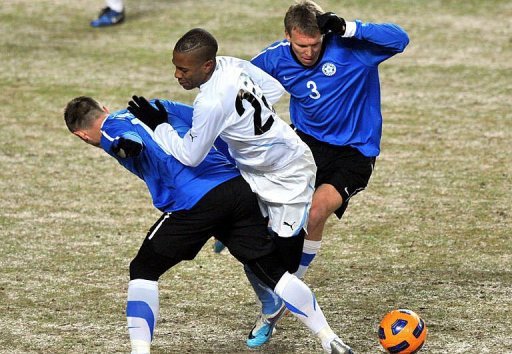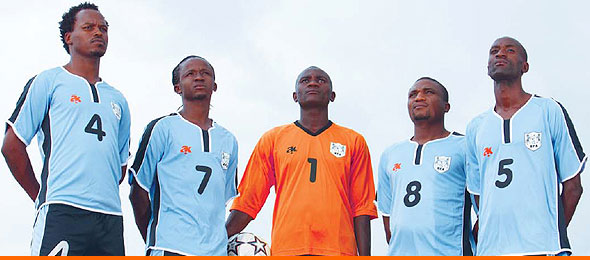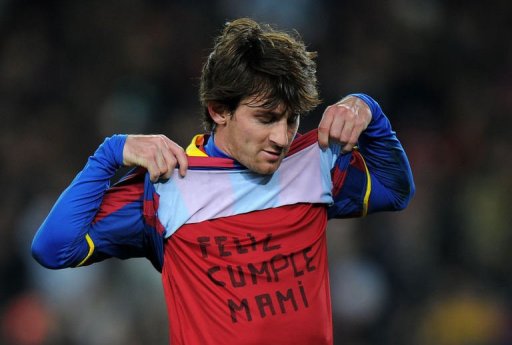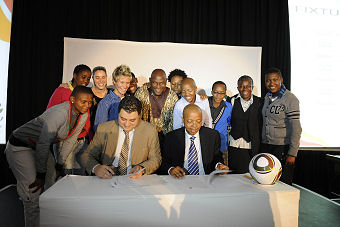
Uruguay’s fee for materializing on the Ice in Estonia.
Category: Players
The Zebras Make History

By Hikabwa Decius Chipande in Gaborone, Botswana
Saturday, March 26, 2011, was a day of jubilation in Gaborone, the capital city of Botswana. The Zebras — Botswana’s national football team –- made history by qualifying for next year’s African Nations Cup in Gabon and Equatorial Guinea. The Zebras boasted an unbeaten record after defeating Tunisia and Togo — teams with World Cup finals experience — and needed three points in N’Djamena against hosts Chad to qualify for the first time for the prestigious biennial tournament. Botswana accomplished this task, amazingly, with two games to spare after beating Chad 1-0 and topping their qualification group with 16 points.
The day of the match between Botswana and Chad was full of excitement in Gaborone. A lot of people wore national football team regalia, while national colors adorned public transport buses and private cars. The mood in the city was electric and expectant such that one would think that the match was being played at the National Stadium in Gaborone.
When the match started, people watched it indoors on Botswana Television while motorists listened to radio commentary in their vehicles. Hundreds of people watched the match live on huge television screens erected in Fair Grounds in the middle of the city, courtesy of Orange — the mobile phone service provider and official sponsor of the national team. When the match started the city was quiet; one could only hear radio and television commentary echoing through the air.
Then in the 54th minute fans exploded in celebration when Botswana’s Jerome Ramatlhakwana scored. After the final whistle, there was euphoria in Gabs. A lot of people came out of their homes jumping and singing, while motorists were honking in all directions. The Botswana Football Association President, Mr. David Fan, pointed out that this qualification was long overdue and it means a lot for football in Botswana. “The people of Botswana have long been waiting for this moment. The fact that we have achieved this feat is a huge cause for celebrations,” said Mr. Fani.
For a country of about 1.8 million people, the historic win in Chad is no random occurrence. After the game, an overjoyed Stan Tshosane, the national team coach, thanked the team for their relentless effort and meticulous preparations. “It’s a culmination of hard work,” said Tshosane; “We knew what we were doing from the onset.”
The Minister of Youth, Sport and Culture, Mr. Shaw Kgathi, gave a statement in Parliament assuring the Zebras and the country’s football fans that the government of Botswana would continue funding and supporting the preparations for the 2012 African Nations Cup. The victorious Zebras will be given an official welcome reception by the President, Lt. Gen. Seretse Khama Ian Khama, on April 8 in Gaborone.
Indi’s Freestyle
Indi Cowie — a 16-year-old soccer phenom from North Carolina — can freestyle with the best. “The family garage is her laboratory,” notes the New York Times Magazine. “There are times when there’s an enormous bang and I wake up at 5 in the morning thinking there’s an intruder in the house,” says Indi’s father, Logan Cowie. “Then I realize it’s just Indi practicing her latest trick.” Interestingly, Indi plays with a boys’ club team rather than with her high school’s girls’ team. Would she rather be the best freestyler or the best soccer player in the world, she answers: “You mean I have to pick one? I can’t. Both.” Read the full article here.

The Spanish Football Federation fined Lionel Messi between 2000 and 3000 euros for revealing a t-shirt during a goal celebration that wished his mother a happy birthday. The referee did not issue the world player of the year a yellow card, but noted this “crime” in his match report.
In today’s Disneyball, communicating anything other than an officially sanctioned marketing message or corporate sales pitch is not tolerated. Shame on Spain — reigning world champions — for punishing freedom of speech and insulting our core humanity.
2010 was the year of Africa’s first World Cup, a historic year for South Africa and for the continent. An hour west of Durban’s huge Moses Mabhida Stadium, in the KwaZulu-Natal hills, every weekday afternoon 46 boys train on a modest football ground at the University of KwaZulu-Natal in Pietermaritzburg. These 13-year olds symbolize the immense potential of grassroots football in South Africa.
In an atmosphere of quiet industriousness and positive support, the boys of the Izichwe Youth Football programme go through fitness routines, refine individual skills, and play small-sided games under the watchful eye of several local coaches.
Named after the regiment commanded by Shaka Zulu two centuries ago, Izichwe is a not-for-profit development program providing access to high-level football training and life skills instruction to black youth from the Pietermaritzburg area. Working on a shoestring budget, it helps to overcome enduring barriers to participation in sport for black youth in a democratic South Africa.
It has been an honor and a privilege for me to be part of Izichwe while a Fulbright Scholar at the University of KwaZulu-Natal. I am grateful to Thabo Dladla, Izichwe’s founding director, for warmly welcoming my family into this wonderful sporting community. One of my daughters joined Izichwe–the only girl and the youngest player by three years.
As our involvement with the program intensified, I realized that I had come full circle from my first visit to South Africa in 1993 as a young volunteer sports coach in Khayelitsha, a massive black township on the outskirts of Cape Town. Now I was here with my entire family and I got to rekindle and sharpen my coaching inclinations. I also gave occasional classroom lectures to the youngsters, prepared them for an oral history project, and helped with the year-end function (see video above).
There is something very special about Izichwe. Thabo Dladla, Mhlanga Madondo, “Styles” Mkhize, Patrick “Cutter” Mthembu, Xolani Madlala, Ronnie Chetty and Kristen Konkol provide specialized coaching and caring, constructive leadership. Their positive, non-authoritarian approach aims at unleashing the boys’ potential on and off the football pitch.
Izichwe’s approach is not so much about winning games and tournaments, but about teaching technical, tactical, psychological and physical skills that will serve the teenagers well down the road. This long-term vision of achievement can be tough on the boys. I have seen them lose against teams stacked with over-age players. A few years down the road it will be interesting to compare the achievements of the Izichwe boys with those of the over-age players.
To understand Izichwe is to appreciate how football is closely linked to the physical, intellectual and social growth and development of historically disadvantaged South African youth. Most players come from tough socio-economic circumstances and at Izichwe they learn sport’s values of teamwork, hard work, discipline, and achievement. The daily training routines provide needed structure to these student-athletes’ lives. In many cases, I have seen individuals acquire confidence, strengthen their self-esteem and self-awareness, and even improve their academic performance.
Next year I hope that a girls’ team will be up and running at Izichwe. It is important that the same opportunities offered to boys are also made available to girls. I am confident that a few years from now, many Izichwe veterans—male and female—will be representing their country and competing in top leagues. For those individuals who will opt for a career in something other than football, Izichwe will have empowered them with skills, knowledge and experience to become good citizens and community builders.
As I prepare to leave South Africa in a few days, I want to take this opportunity to thank my fellow coaches and the players at Izichwe. Their warmth, generosity and brotherhood will never be forgotten. This moving experience has reminded me of a German theologian’s response to a question about how to explain happiness to a child: “I wouldn’t explain it,” Dorothee Solle said; “I’d toss him a ball and let him play.”
On Sunday, October 17, 2010, history was made in the Italian serie A: a match was stopped due to fans’ racist chants. It happened at the Sant’Elia stadium in Cagliari (on the island of Sardinia). Just two minutes in, referee Paolo Tagliavento had enough of the monkey chants from the Cagliari ultras directed at Inter striker Samuel Eto’o.
Tagliavento blew his whistle, explained his decision to the two captains, then ordered the fourth official to have this announcement made over the stadium’s public address system: ‘If racist chants persist, the match will be suspended.’ It was repeated twice.
After the announcement no monkey chants poisoned the atmosphere. In a delicious twist to this sad affair, Eto’o went on to score the only goal of the match and celebrated by ‘monkeying’ around!

The draw for the 2010 African Women’s Championship was held yesterday at the Birchwood Hotel in Ekurhuleni, east of Johannesburg. The official schedule released by CAF and SAFA reveals that matches will take place at Daveyton’s Sinaba Stadium and Tembisa’s Makhulong Stadium from 31 October to 14 November 2010. However, it remains unclear where each match is taking place and what the kickoff times are.
South African media covered the draw in perfunctory fashion. Local officials repeated platitudes heard daily during the 2010 World Cup: the tournament will market Brand South Africa, foster unity and pride, and so on. ‘This is yet another opportunity to put South Africa and Africa on the global map,’ said Ekhuruleni councillor Ndosi Shongwe in a typical remark. ‘We will be calling all our people to rally behind Banyana Banyana in the same way we did for Bafana Bafana during the 2010 FIFA World Cup. Bafana united us as a nation, now let’s allow the Women’s National Team to take over the baton. To us this is more than just winning the trophy; it is about uniting the country towards social cohesion,’ Shongwe added.
The bigger and more important question, however, is: what will be the impact of this tournament on the development and growth of South African (and African) women’s football at junior, amateur, and elite levels?
This is a crucial question given that the number of female players — mostly black — continues to grow alongside their ongoing marginalization and exclusion in a male-dominated football world. (Suggested reading: Prishani Naidoo and Zanele Muhoi, ‘Women’s bodies and the world of football in South Africa,’ in Ashwin Desai’s The Race to Transform: Sport in Post-Apartheid South Africa (free download here)